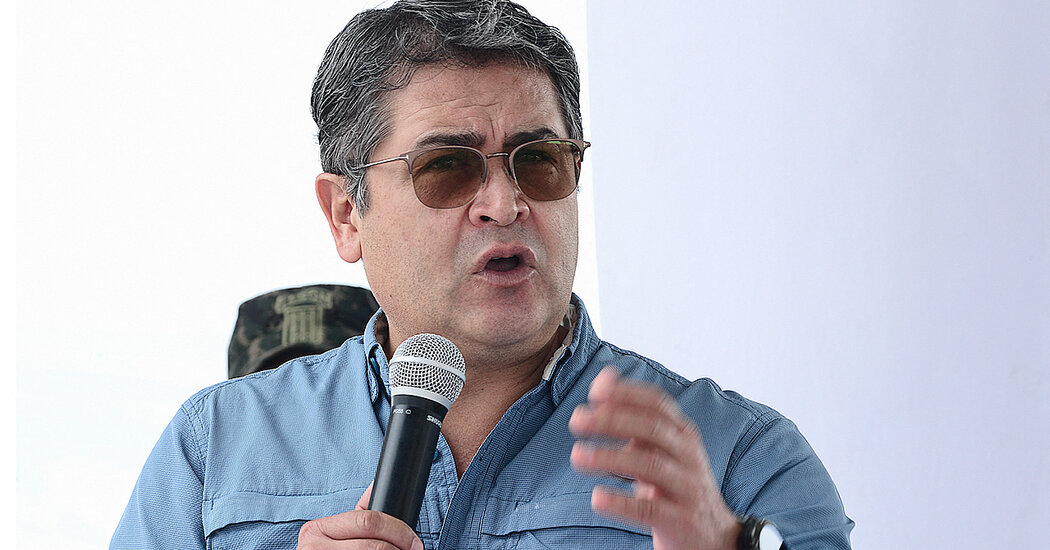
TEGUCIGALPA, Honduras — The Honduran Supreme Court ratified on Monday the United States’ extradition request for the former president, Juan Orlando Hernández, setting the stage for what could become the highest profile drug trafficking case in New York since the trial of the Mexican cartel chief Joaquín Guzmán, known as El Chapo.
In a unanimous ruling, the court rejected a motion from Mr. Hernández’s lawyers to block the extradition request filed in February by the United States. Following the ruling, Mr. Hernández’s legal team said that it is looking at the possibility of applying for a court injunction, though it was unclear what legal recourse the lawyers have left to avoid their client’s trial abroad.
“What was declared today is the extradition. He was not declared guilty or innocent,” Tomás Zambrano, head of Mr. Hernandez’s National Party in congress, told the local television station HCH after the ruling. “As nationalists and Hondurans, we express our solidarity with the family of president Hernández.”
Sporadic fireworks went off in different parts of the Honduran capital of Tegucigalpa as some residents celebrated the decision against a deeply unpopular former president, under whose rule the country became more authoritarian and corrupt.
U.S. officials have accused Mr. Hernández, who stepped down in January after his party suffered an overwhelming defeat in the November general election, of colluding with drug cartels to ship tons of cocaine to the United States in return for financial support for his political party, according to the extradition request.
U.S. officials said that Honduras emerged, under Mr. Hernández, as one of the largest drugs transit hubs in Latin America and that the former president allowed cartels to penetrate the highest echelons of his country’s government.
Collusion with cartels has worsened Honduras’ already chronic corruption and undermined its democracy, contributing to mass migration out of the country and leading to Mr. Hernández’s party’s loss at the polls last year.
His successor, Xiomara Castro, has promised to overhaul what she called a “narco state” built by Mr. Hernández.
Honduran police officers surrounded the house of the former president on Feb. 15, just minutes after Ms. Castro’s officials said they had received the extradition request.
The former president was led from his home in shackles later that day, shocking a Central American nation accustomed to officials operating with impunity. As spontaneous celebrations broke out that evening in Tegucigalpa, Ms. Castro’s supporters chanted “Juancho is going to New York,” calling Mr. Hernández by his nickname.
While Ms. Castro has moved swiftly against officials in the former administration who were implicated in crimes, she has so far shown little desire to punish allies, darkening the perception of her anti-corruption promises, said Honduran analysts.
In a handwritten letter released by Mr. Hernández’s wife on social media on Monday, Mr. Hernández wrote that he is an innocent victim of revenge by the drug cartels, whose extradited members made false statements to U.S. prosecutors to punish him for his fight against organized crime.
The letter also conveyed his resignation to a long term in prison. “I conclude that by facing three life sentences, I could become a walking dead,” he wrote.
The extradition request, presented to Honduras’s Supreme Court and seen by The New York Times, claims that Mr. Hernández participated in a “violent drug-trafficking conspiracy” that since 2004 has transported 500 tons of cocaine from Venezuela and Colombia to the United States via Honduras. The document claims that Mr. Hernández received millions of dollars in bribes for facilitating the shipments and shielding traffickers from prosecution.
The former president’s brother, Juan Antonio Hernández, is serving a life sentence in the United States for cocaine trafficking. Another convicted cocaine trafficker who implicated the former president, Geovanny Fuentes, received a life sentence earlier this year.
The looming extradition of Mr. Hernández could have regional consequences if the former president decides to negotiate with the federal prosecutors, said Joaquín Mejía, a Honduran human rights law expert.
“He was the kingpin in Honduras, but the drugs came from Colombia and Venezuela and passed on to Guatemala and Mexico,” he said, “creating a criminal structure involving high-level people from the economic and political sectors of all those countries.”




